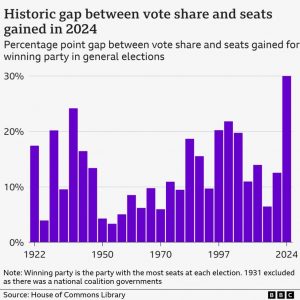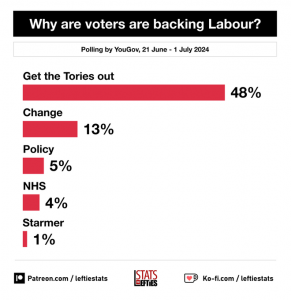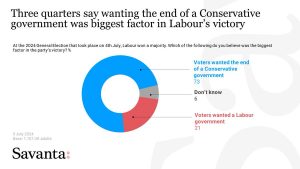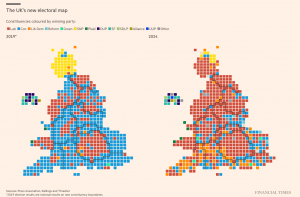British voters didn’t so much embrace Keir Starmer’s Labour as they repudiated the terrible Tories
by Pauline Park, Ph.D.
British voters didn’t so much embrace Keir Starmer’s Labour as they repudiated the terrible Tories in the general election held on July 4 of all days. The 2024 general election will be remembered for many things — not least for the Conservative Party’s worst performance in a general election since being founded in 1834 — but it should not be misread by Sir Keir Starmer as an endorsement of his colorless and almost apolitical campaign; instead, the general election landslide was due to four factors.
First, the British ‘first past the post’ system (‘winner take all’ in American parlance) greatly exaggerates the winning party’s popular vote by giving it a disproportionate number of seats in the House of Commons (Morning Star editorial board, “Turn a Historic Tory Defeat Into a Change of Course for Britain,” Morning Star, 7.5.24). Labour won 411 seats out of 650 in the House of Commons, the Conservatives 121, the Liberal Democrats 71, the Scottish Nationalist Party (SNP) 9 and other parties won 36 seats — including 4 for the Green Party. But the 174-seat majority Keir Starmer won — 63% of the seats — was based on 33.7% of the popular vote — the smallest popular vote share of any majority government in British history. Keir Starmer had called Labour’s performance under his progressive predecessor Jeremy Corbyn a ‘disaster,’ but Labour’s share of the popular vote fell under Starmer.
In a YouGov poll (6.21.24-7.1.24), 48% of those who said they intended to vote Labour did so in order to get the Tories out, 13% said they wanted change, 5% cited policy, 4% cited concerns over the National Health Service and only 1% said they were voting Labour to make Keir Starmer prime minister. Hence, the enormous majority won by Labour cannot be interpreted as an endorsement of the Labour Party generally or of Keir Starmer’s leadership in particular.
Second, the Conservative Party collapsed: 12 cabinet ministers lost their seats as the Tories won only 23.7% of the vote; the dramatic fall from 365 seats to 121 was the biggest loss of seats in the history of the House of Commons and the worst performance by the Conservative Party since it was founded in 1834. The confidence in what many had come to believe was the ‘natural party of government’ was shattered by the utter incompetence and corruption of five prime ministers (David Cameron, Boris Johnson, Theresa May, Liz Truss and Rishi Sunak).
Third, Reform UK surged, winning 14% of the vote though just 1% of the seats in parliament. The eighth time was the charm for Nigel Farage, who was elected MP for the first time, leading four other Reform UK candidates into parliament; the founder of the United Kingdom Independence Party (UKIP) that championed Brexit — Britain’s exit from the European Union — significantly undercut the Tories as many voters abandoned the Conservative Party in favor of the even more right-wing anti-immigrant Reform UK.
Fourth, the Scottish National Party was wiped out, with Scottish Labour giving the Labour Party the margin needed to win an enormous parliamentary majority. Nicola Sturgeon had led the SNP to win 48 seats in the Westminster parliament with 45% of the vote in Scotland in the 2019 election in the 2024 general election, John Sinney led the SNP to win just 9 seats with 29.9% of the vote in Scotland and 3% nationally; those 39 seats were all lost to Labour and were a significant reason for Labour’s extraordinarily large majority.
Fifth, the Liberal Democratic Party cleverly played the system, encouraging tactical voting in districts held by Conservative MPs and winning 72 seats in parliament; Sir Ed Davey also used social media to publicize his attention-getting stunts — far more imaginative than anything the stodgy Starmer and Sunak did during the campaign. The Greens also won 4 seats (1% of the seats) — up from 1 seat— with 7% of the vote.
Sixth, it is important to point out that five independent candidates defeated five Labour candidates on a pro-Palestine platform of criticism of Apartheid Israel’s Gaza genocide—most notably, Jeremy Corbyn. Zionists had ousted Corbyn because of his mild criticisms of Apartheid Israel as part of a witch hunt in which Keir Starmer helped drive out virtually every pro-Palestine progressive in the Labour Party in parliament with false accusations of anti-Semitism; hence it was an especially significant victory for progressives for Corbyn to win re-election in Islington North over the officially endorsed Labour candidate in a district Corbyn had represented for 40 years — including as party leader from 2015 to 2020.
Taking all of this into consideration, Keir Starmer would be a fool to interpret the general election as a personal endorsement of him much less of his Zionist support for Apartheid Israel and its Gaza genocide; while he has a safe majority for at least another four to five years, he has no personal mandate and he failed to generate any general enthusiasm for Labour much less for him personally in the most consequential British general election of a generation.
Pauline Park is a member of the Out-FM collective that produces LGBTQ-relevant programming for WBAI at 99.5 FM. She did her M.Sc. in European studies at the London School of Economics & Political Science and her Ph.D in political science at the University of Illinois at Urbana-Champaign. At LSE, she studied British politics and government with Prof. Alan Sked and French politics and government with Prof. Howard Machin, writing her master’s thesis on the economic policy of the administration of François Mitterrand; she wrote her doctoral dissertation on the Maastricht Treaty on European Union.
박 토크






